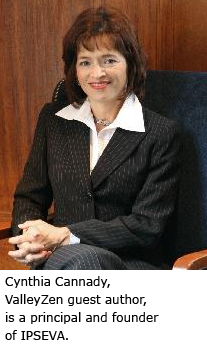Zen and Venn in Technology Deals Part II (Guest Post)
Today’s post is the sequel to the preceding post “Zen and Venn.” Read it here. Self-study is a prerequisite to finding the Venn lemon shaped common ground. We cannot know what we have in common with another if we do not know our own interests and objectives. One of the most common errors in technology licensing is that the parties come to the negotiating table without having prepared. To avoid this, advance preparation for negotiation means studying, identifying, and discussing within the negotiation team, our positions on key terms, while remaining flexible. We use a negotiation tool: an internal term sheet. This is a way of drawing the Venn diagram circle that represents our “side” or set of interests. Self-study is the key but often neglected preparation for negotiation.

Mindfulness is important in negotiation because it helps us avoid the common error of listening only when we ourselves are talking. Zen teaches that emptiness means openness and receptivity. A corollary is that aggression against the other party, like loud noise and boasts, is counterproductive. Emptiness means that you can see and hear clearly what the other party is saying. This gives you a strategic advantage.
“Clay is molded into a vessel;
Because of the hollow we may use the cup.
Walls are built around a hearth;
Because of the doors we may use the house.”
–Tao Te Ching, On Tools
Compassion teaches us to see the other point of view. One of the lawyers who shaped my early practice taught me that in negotiation you must always “leave something on the table.” We have all seen inexperienced negotiators who think that successful negotiation means beating the other side into submission, a “my way or the highway” approach. Zen teaches:
“The fool thinks he has won a battle when he bullies with harsh speech, but knowing how to be forbearing alone makes one victorious.” –Samyutta Nikaya I, 163
Experienced negotiators appreciate that good agreements are based on finding mutual benefit; high handedness defeats the effort to find common ground. The Buddhist tradition counsels a detachment of ego that experienced negotiators recognize as the masterstroke. As Lao Tzu taught:
“When conflict is reconciled, some hard feelings remain;
This is dangerous.
The sage accepts less than is due
And does not blame or punish;
For harmony seeks agreement
Where justice seeks payment.
Fill a cup to its brim and it is easily spilled;
Temper a sword to its hardest and it is easily broken;
Amass the greatest treasure and it is easily stolen;
Claim credit and honor and you easily fall;
Retire once your purpose is achieved – this is natural.”

Fortunately, the technology deal lends itself to Zen and Venn. This is because there are many variables and many ways to arrange the key terms and conditions. The negotiator’s creativity and advance preparation through self-study and contained ego make it possible to find a way to share technologies and knowledge.
“Thousands of candles can be lit from a single candle,
And the life of the candle will not be shortened.”
—Sutta Nipita
Finally, simplicity. The contract that records a win-win deal can be short, clear and sweet.
Click for Part I of this post.
Cynthia Cannady, the author of this post, is a principal and founder of IPSEVA. She is an expert in intellectual property strategy and technology licensing. She holds a juris doctor degree from Harvard Law School and a bachelor degree with honors from Stanford University. She is a member of the Bars of the State of California and the District of Columbia. Prior to founding IPSEVA, she served for six years as the Director of the Intellectual Property and New Technologies Division at WIPO (World Intellectual Property Organization) in Geneva, Switzerland.



Thank you for your beautiful guest posting for ValleyZen. The metaphor of the lemon is a powerful way to think about Zen and Venn.
Your last quote—
“Thousands of candles can be lit from a single candle,
And the life of the candle will not be shortened.”
–is fitting. Interestingly, a flame is also lemon shaped and golden.
What do you think?